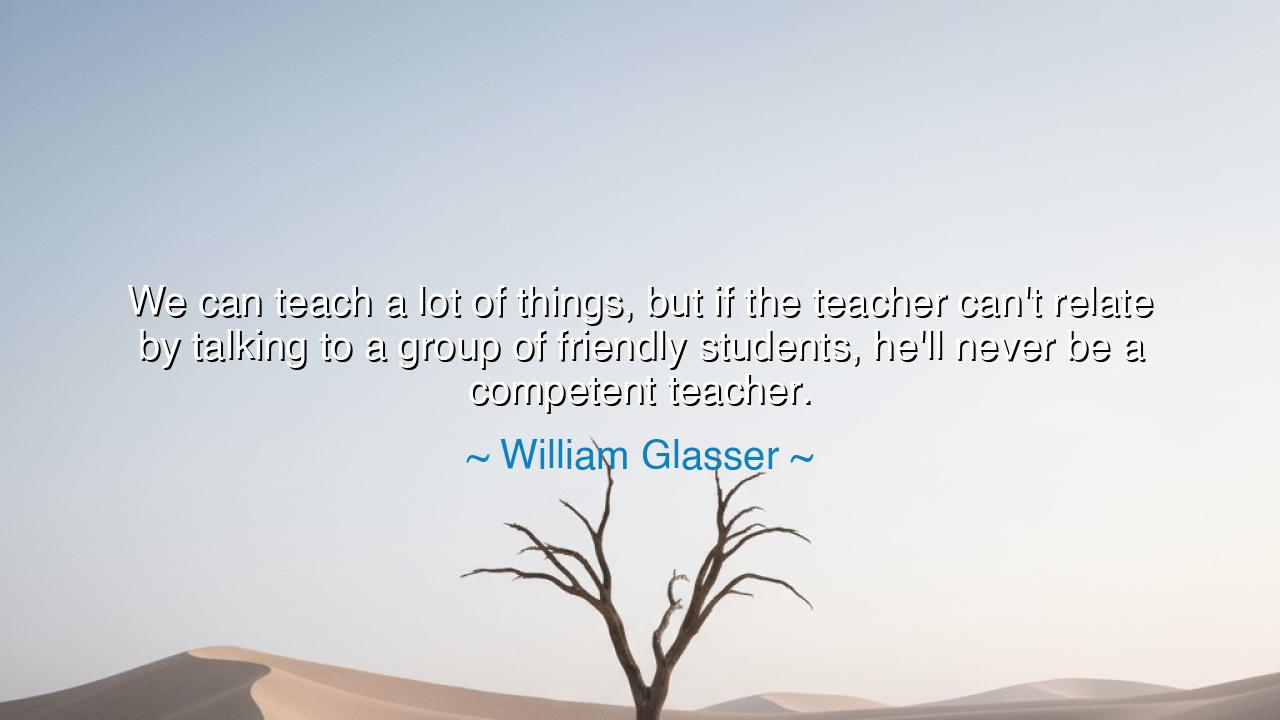
We can teach a lot of things, but if the teacher can't relate by
We can teach a lot of things, but if the teacher can't relate by talking to a group of friendly students, he'll never be a competent teacher.






Hear the voice of William Glasser, a physician of the human spirit and a guide to the paths of learning, who declared: “We can teach a lot of things, but if the teacher can’t relate by talking to a group of friendly students, he’ll never be a competent teacher.” In these words lies a truth both simple and profound: that knowledge by itself is not enough, that skill and mastery of facts do not alone make one a teacher. The true power of teaching is not in the content delivered, but in the connection formed, the living bridge between soul and soul.
The meaning is this: a teacher who cannot relate is like a well brimming with water but sealed with stone—full, yet inaccessible. Facts may be spoken, lessons written, but unless they pass through the channel of relationship, they remain barren. To teach is not merely to speak, but to engage, to kindle, to awaken. The students must not only hear but feel heard; they must not only receive, but recognize themselves in the one who gives. Competence in teaching is measured not by knowledge alone, but by the power to touch minds and hearts together.
Consider the story of Socrates, the ancient philosopher of Athens. He did not lecture from scrolls, nor preach from a high platform. He walked among the youth, questioning them, drawing out their thoughts, making them feel partners in the discovery of truth. By relating to them as friends, he awakened in them the fire of inquiry. It was this connection, not merely his knowledge, that made him the father of philosophy. Socrates taught not only with wisdom but with relationship, and thus his lessons live even after the stones of Athens have crumbled.
History offers us another witness in the life of Booker T. Washington. At Tuskegee, he did not merely impose discipline or dictate learning; he worked alongside his students, ate with them, built with them. They saw in him not a distant figure but a man who shared their struggles and their triumphs. In this way, his influence reached deep, shaping not only their minds but their character. Washington’s greatness as a teacher lay not just in the knowledge he imparted, but in the bond he formed with those he taught.
From this, we see the warning within Glasser’s words: a teacher without connection is like a singer without song, a lamp without flame. He may know the material, but he cannot awaken life in others. Knowledge without relationship is lifeless, but relationship turns knowledge into transformation. For when the students feel seen, they open their minds; when they feel valued, they open their hearts. And in that openness, true learning takes root.
O children of tomorrow, learn this lesson deeply: if you would teach, first learn to relate. Do not hide behind knowledge as armor, but step forth with humility, with warmth, with humanity. Speak not only to minds, but to spirits. Let your words be conversation, not command; let your presence be companionship, not domination. In this way, you will not merely instruct, but inspire; not merely inform, but transform.
Therefore, let your practice be this: teachers, cultivate kindness, patience, and presence; students, cultivate openness, respect, and curiosity. Let classrooms be not cold chambers of information, but warm gatherings of shared discovery. For the secret of competent teaching lies not only in the lessons taught, but in the hearts that are reached.
Thus Glasser’s words endure as a guide for all who walk the path of teaching: “We can teach a lot of things, but if the teacher can’t relate… he’ll never be a competent teacher.” May these words remind you that knowledge alone does not change the world—relationship does. And where knowledge and relationship walk hand in hand, there lies the true power of education.






AAdministratorAdministrator
Welcome, honored guests. Please leave a comment, we will respond soon